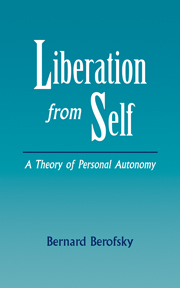Crossref Citations
This Book has been
cited by the following publications. This list is generated based on data provided by Crossref.
REINDAL, SOLVEIG MAGNUS
1999.
Independence, Dependence, Interdependence: Some reflections on the subject and personal autonomy.
Disability & Society,
Vol. 14,
Issue. 3,
p.
353.
Sneddon, Andrew
2005.
Moral Responsibility: The Difference of Strawson, and the Difference it Should Make.
Ethical Theory and Moral Practice,
Vol. 8,
Issue. 3,
p.
239.
Christman, John
and
Anderson, Joel
2005.
Autonomy and the Challenges to Liberalism.
Berofsky, Bernard
2006.
The myth of source.
Acta Analytica,
Vol. 21,
Issue. 4,
p.
3.
Petersen, Verner C.
2007.
“Always work with a straight back”: the fallacies of modern management and the alternative.
The TQM Magazine,
Vol. 19,
Issue. 2,
p.
97.
RUSSELL, LUKE
2009.
Is Situationism All Bad News?.
Utilitas,
Vol. 21,
Issue. 4,
p.
443.
Owen, Gareth S.
Freyenhagen, Fabian
Richardson, Genevra
and
Hotopf, Matthew
2009.
Mental Capacity and Decisional Autonomy: An Interdisciplinary Challenge.
Inquiry,
Vol. 52,
Issue. 1,
p.
79.
Welford, Claire
Murphy, Kathy
Wallace, Meredith
and
Casey, Dympna
2010.
A concept analysis of autonomy for older people in residential care.
Journal of Clinical Nursing,
Vol. 19,
Issue. 9-10,
p.
1226.
Shemmer, Yonatan
2011.
New Waves in Philosophy of Action.
p.
98.
Ploug, Thomas
and
Holm, Søren
2012.
Pharmaceutical information systems and possible implementations of informed consent - developing an heuristic.
BMC Medical Ethics,
Vol. 13,
Issue. 1,
Freyenhagen, Fabian
and
O'Shea, Tom
2013.
Hidden substance: mental disorder as a challenge to normatively neutral accounts of autonomy.
International Journal of Law in Context,
Vol. 9,
Issue. 1,
p.
53.
Hay, Carol
2013.
Kantianism, Liberalism, and Feminism.
p.
1.
Christman, John
2013.
Autonomy and the Self.
p.
127.
Merker, Barbara
2013.
Autonomy and the Self.
p.
23.
McKenna, Michael
2014.
The metaphysical importance of the compatibility question: comments on Mark Balaguer’s Free Will as an Open Scientific Problem.
Philosophical Studies,
Vol. 169,
Issue. 1,
p.
39.
Friedrich, Orsolya
and
Heinrichs, Jan-Hendrik
2014.
Autonomie als Rechtfertigungsgrund psychiatrischer Therapien.
Ethik in der Medizin,
Vol. 26,
Issue. 4,
p.
317.
Fateh-Moghadam, Bijan
and
Gutmann, Thomas
2014.
Governing [through] Autonomy. The Moral and Legal Limits of “Soft Paternalism”.
Ethical Theory and Moral Practice,
Vol. 17,
Issue. 3,
p.
383.
Schaefer, G. Owen
Kahane, Guy
and
Savulescu, Julian
2014.
Autonomy and Enhancement.
Neuroethics,
Vol. 7,
Issue. 2,
p.
123.
Christman, John
2014.
Relational Autonomy and the Social Dynamics of Paternalism.
Ethical Theory and Moral Practice,
Vol. 17,
Issue. 3,
p.
369.
Ploug, Thomas
and
Holm, Søren
2015.
Doctors, Patients, and Nudging in the Clinical Context—Four Views on Nudging and Informed Consent.
The American Journal of Bioethics,
Vol. 15,
Issue. 10,
p.
28.





